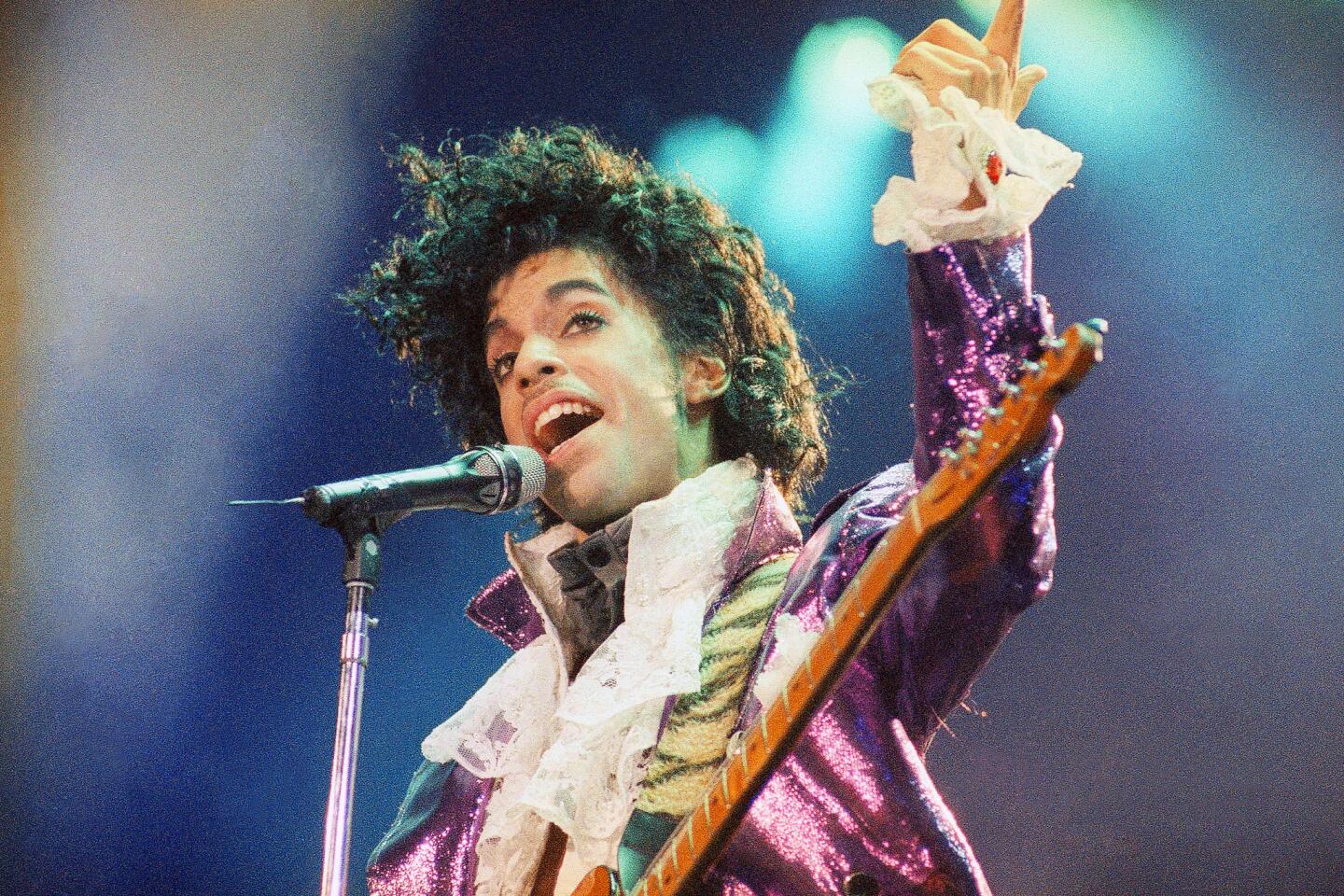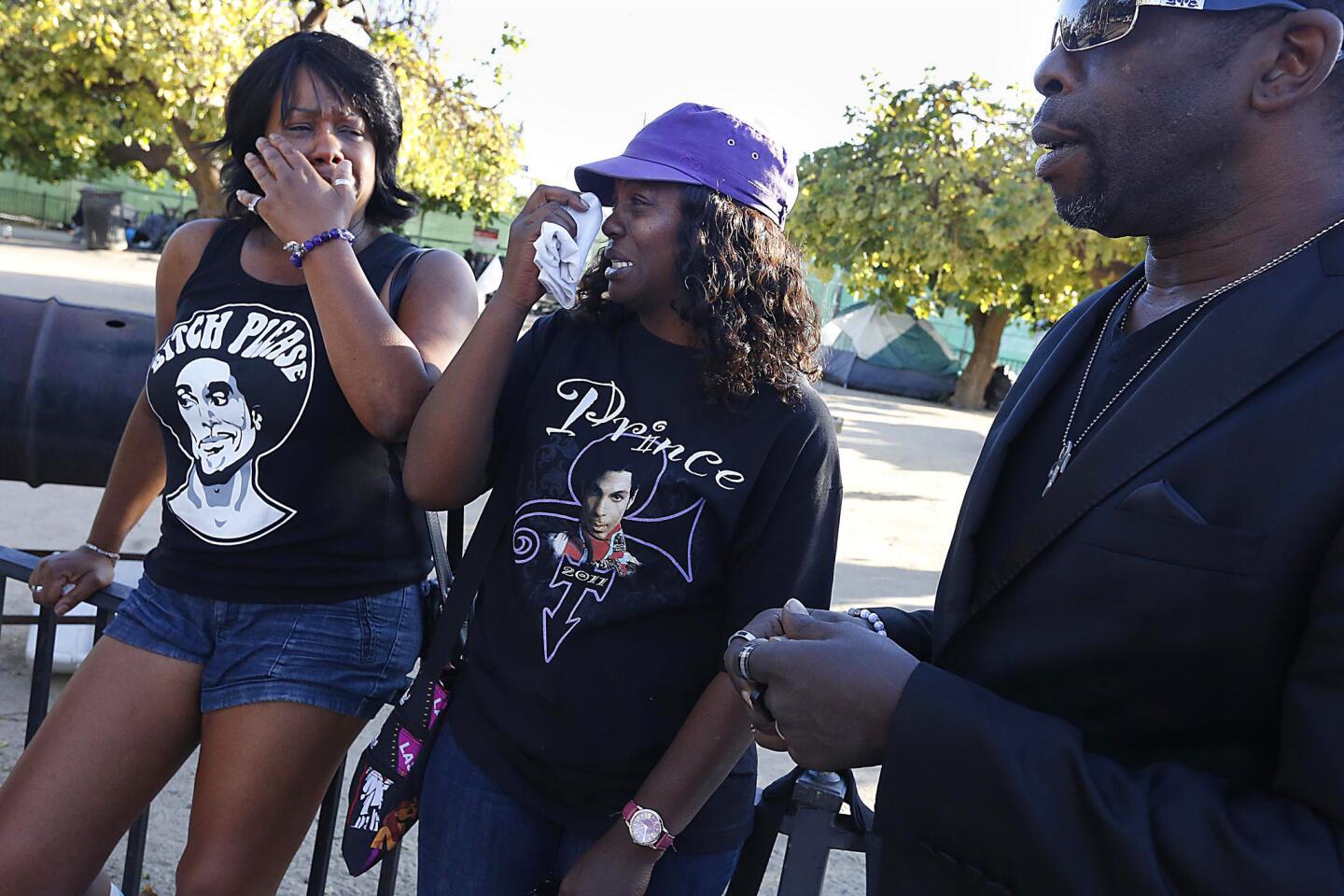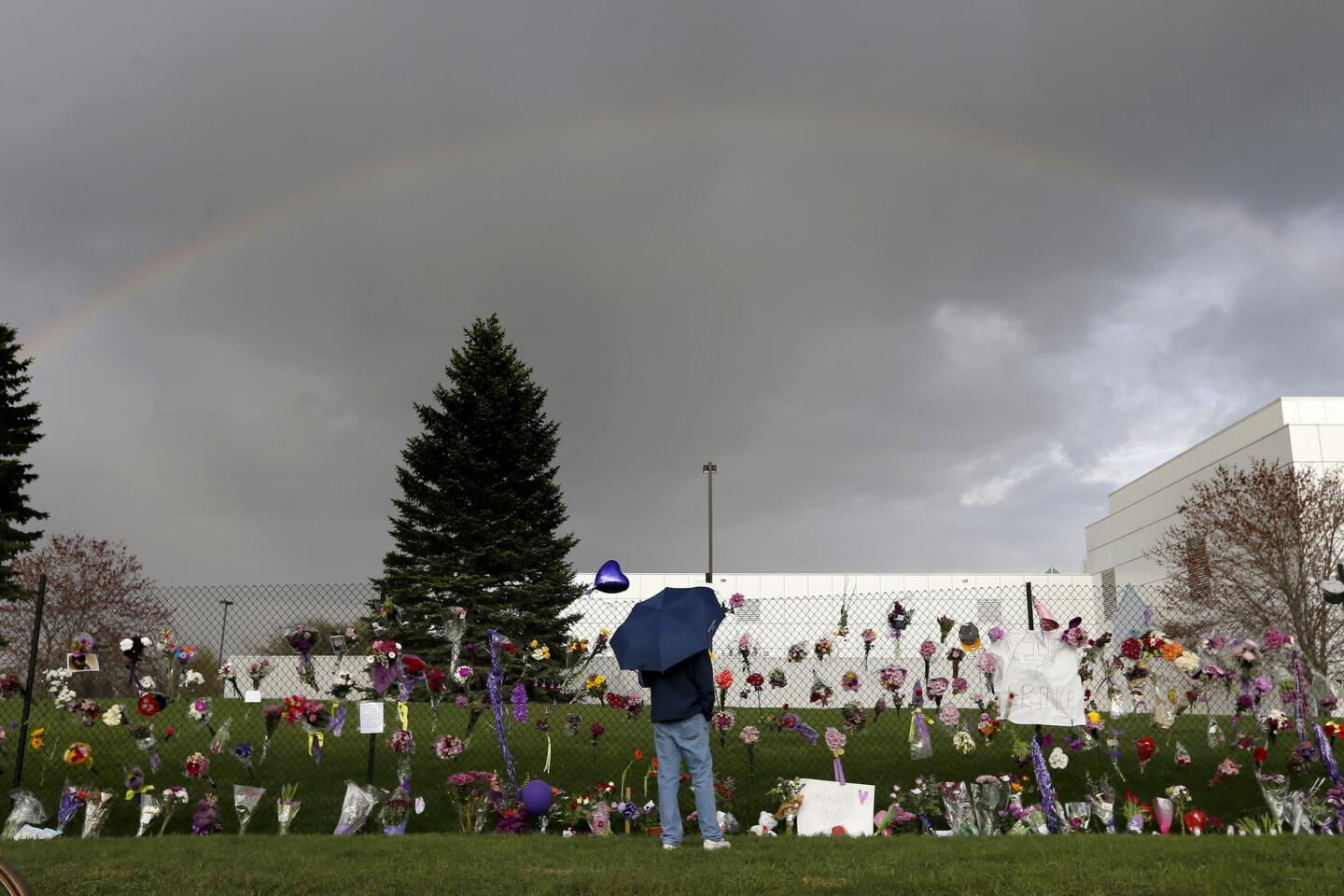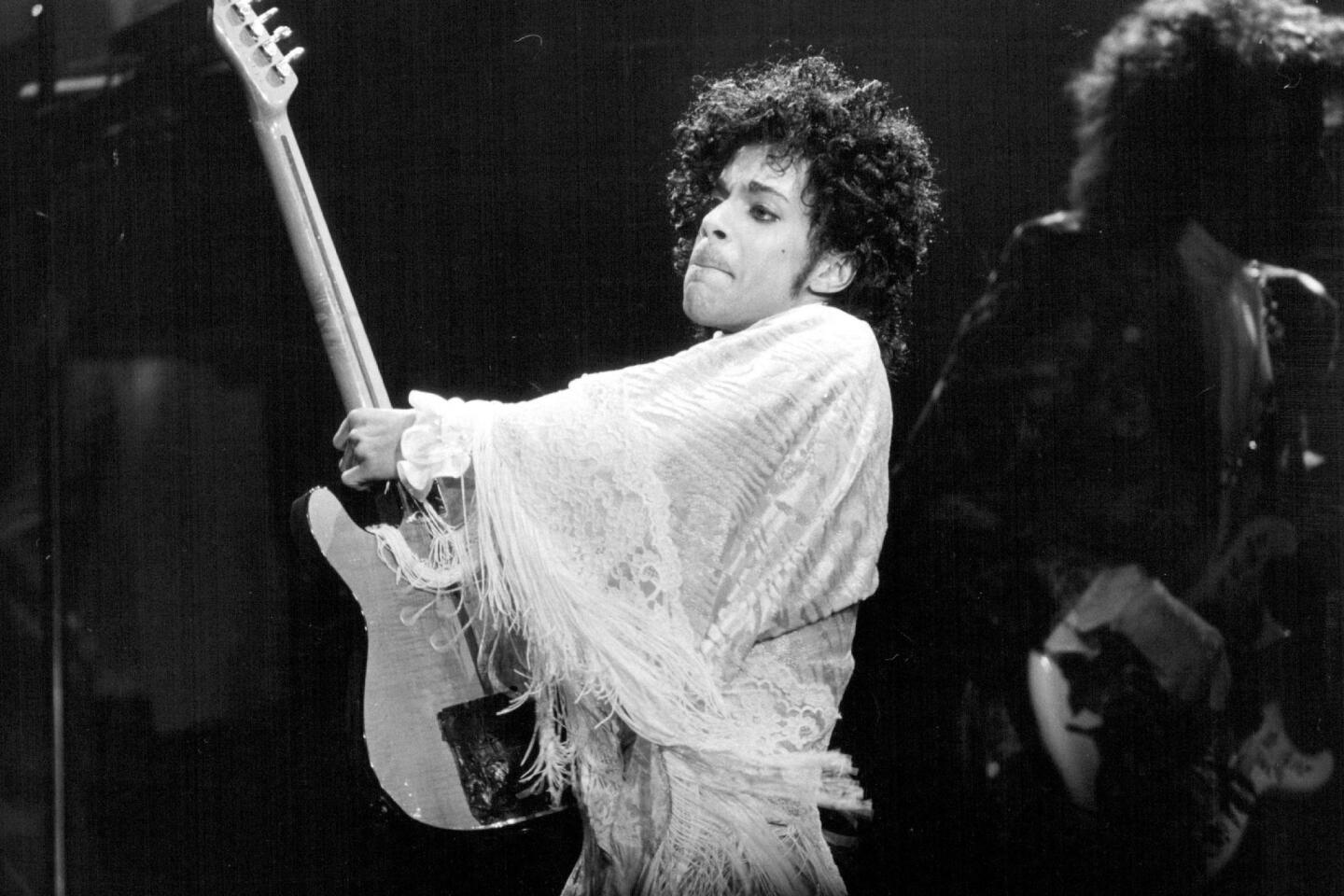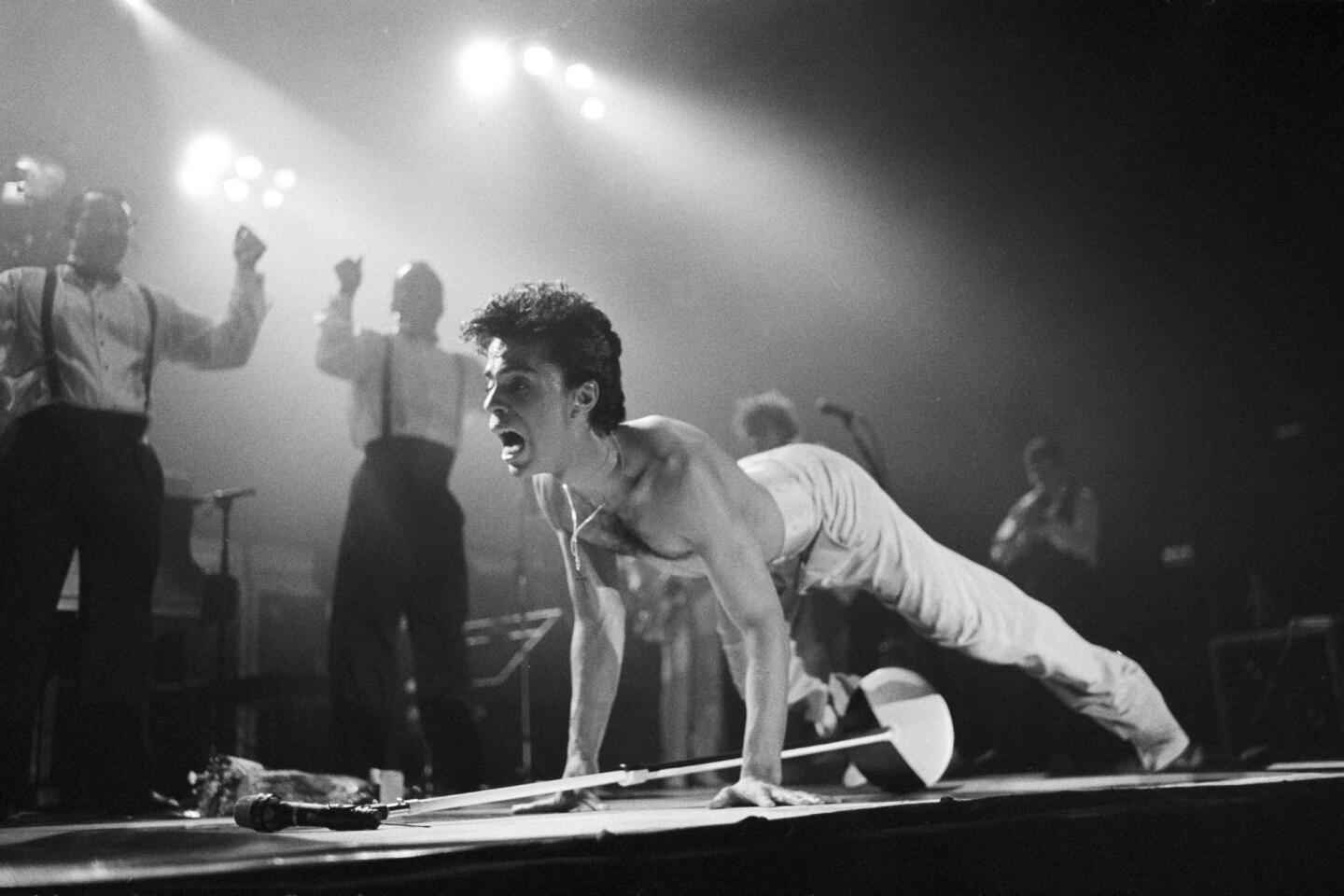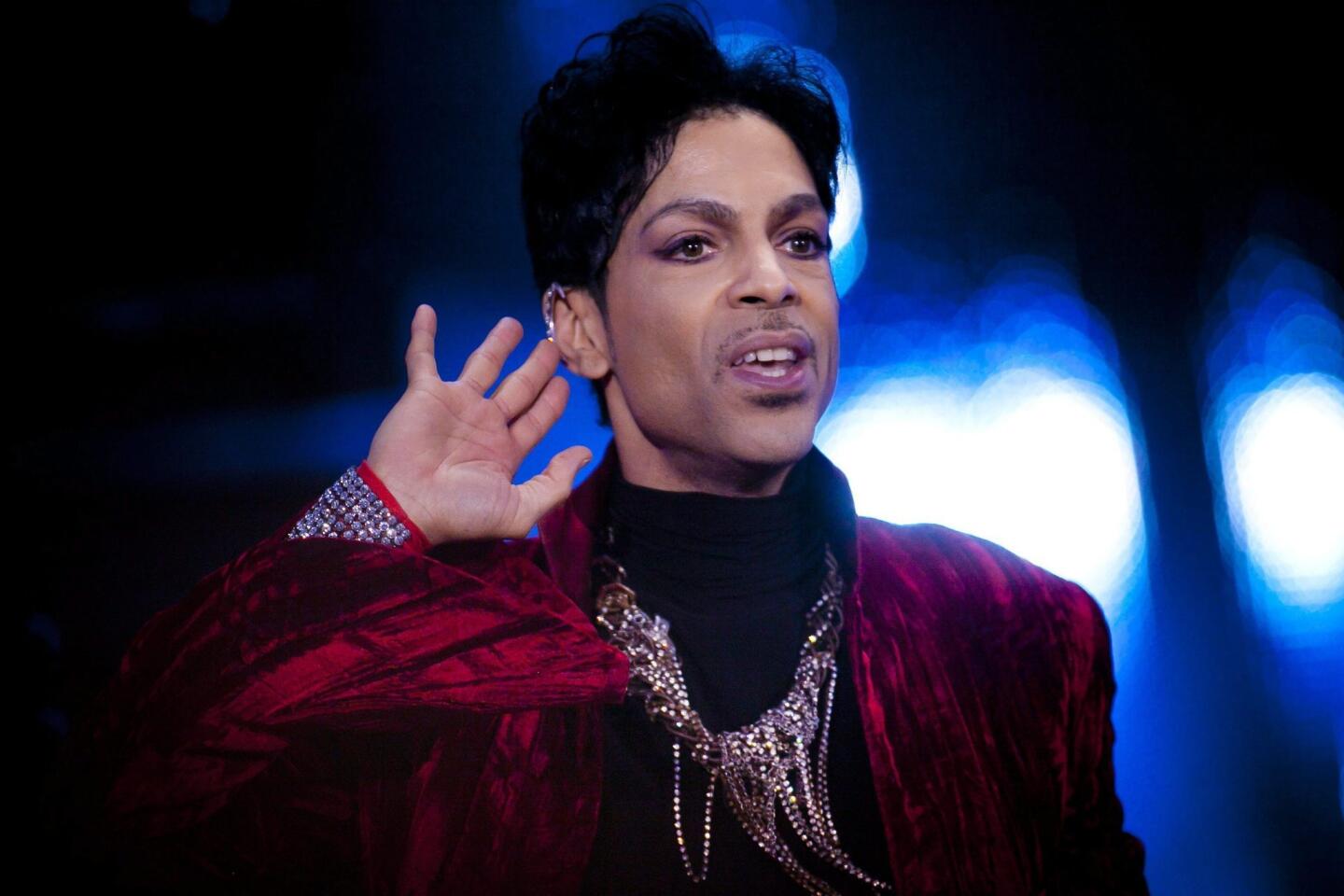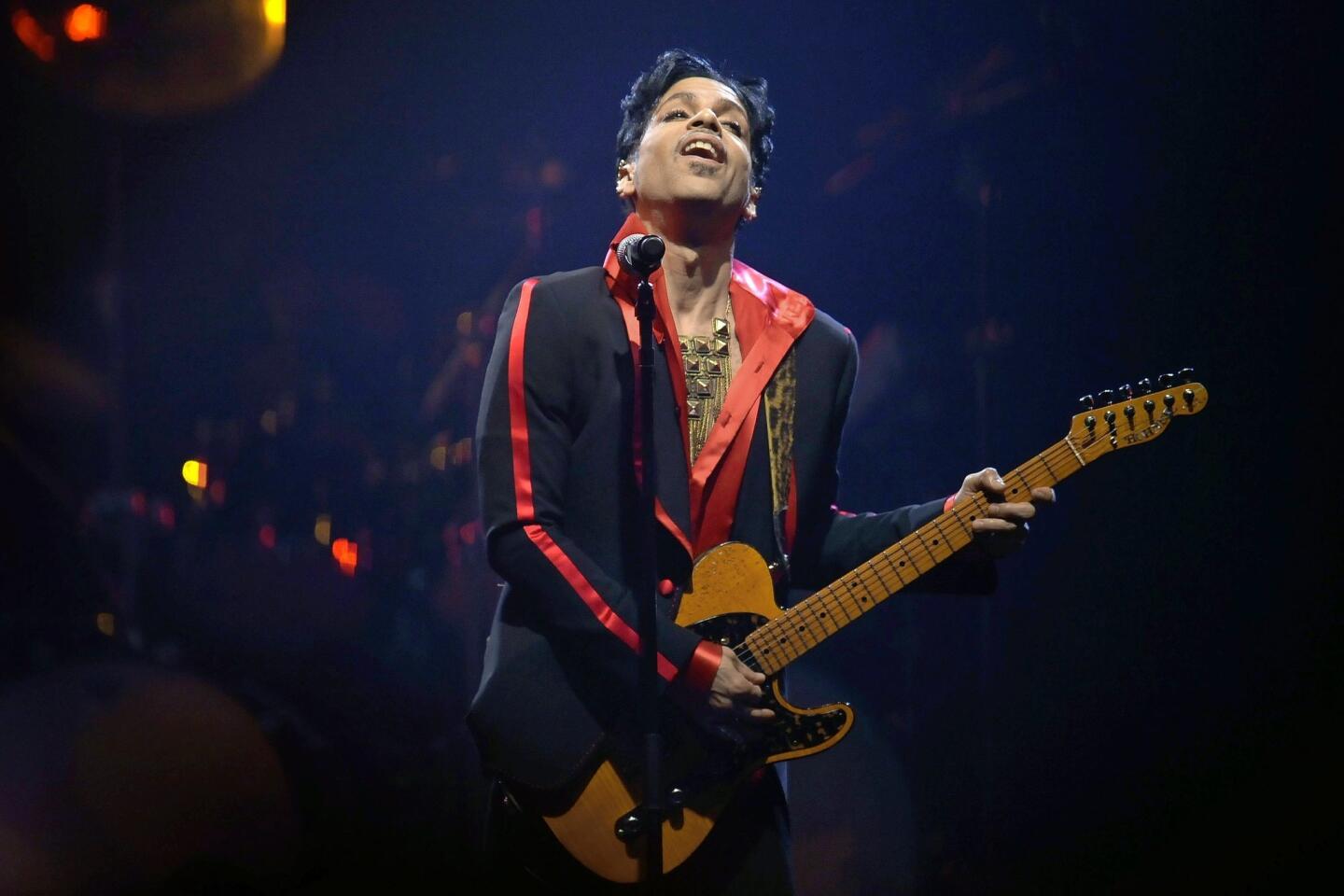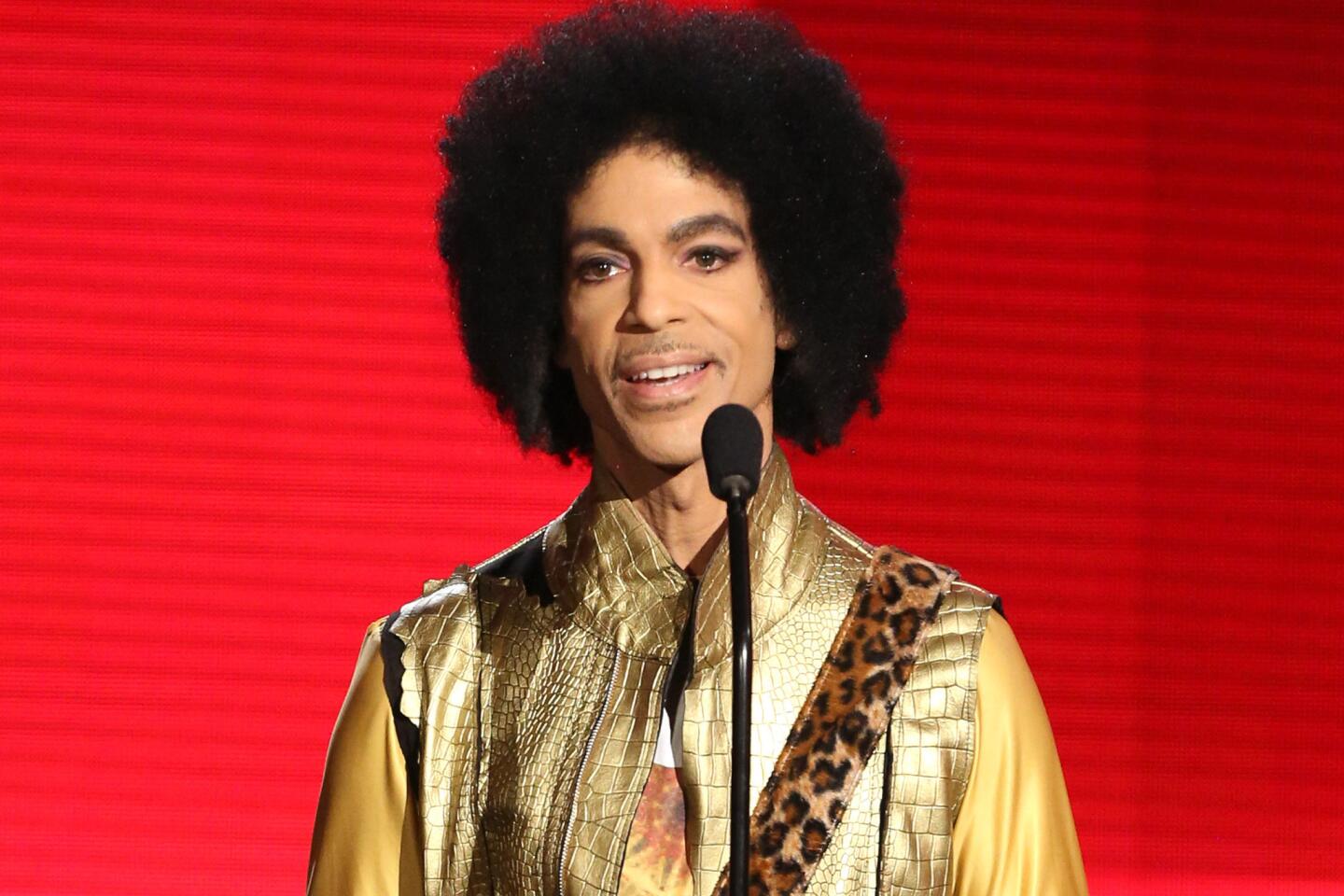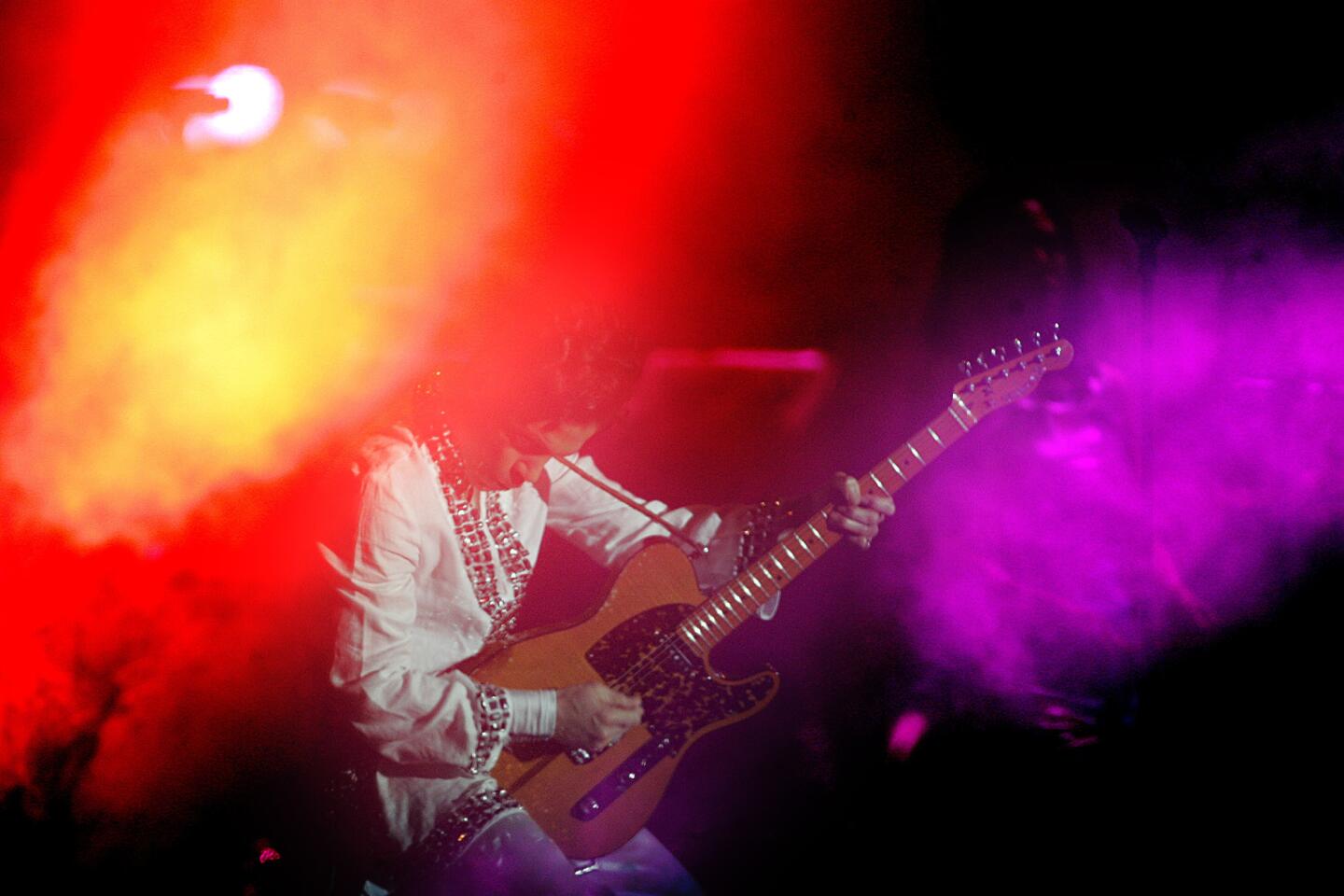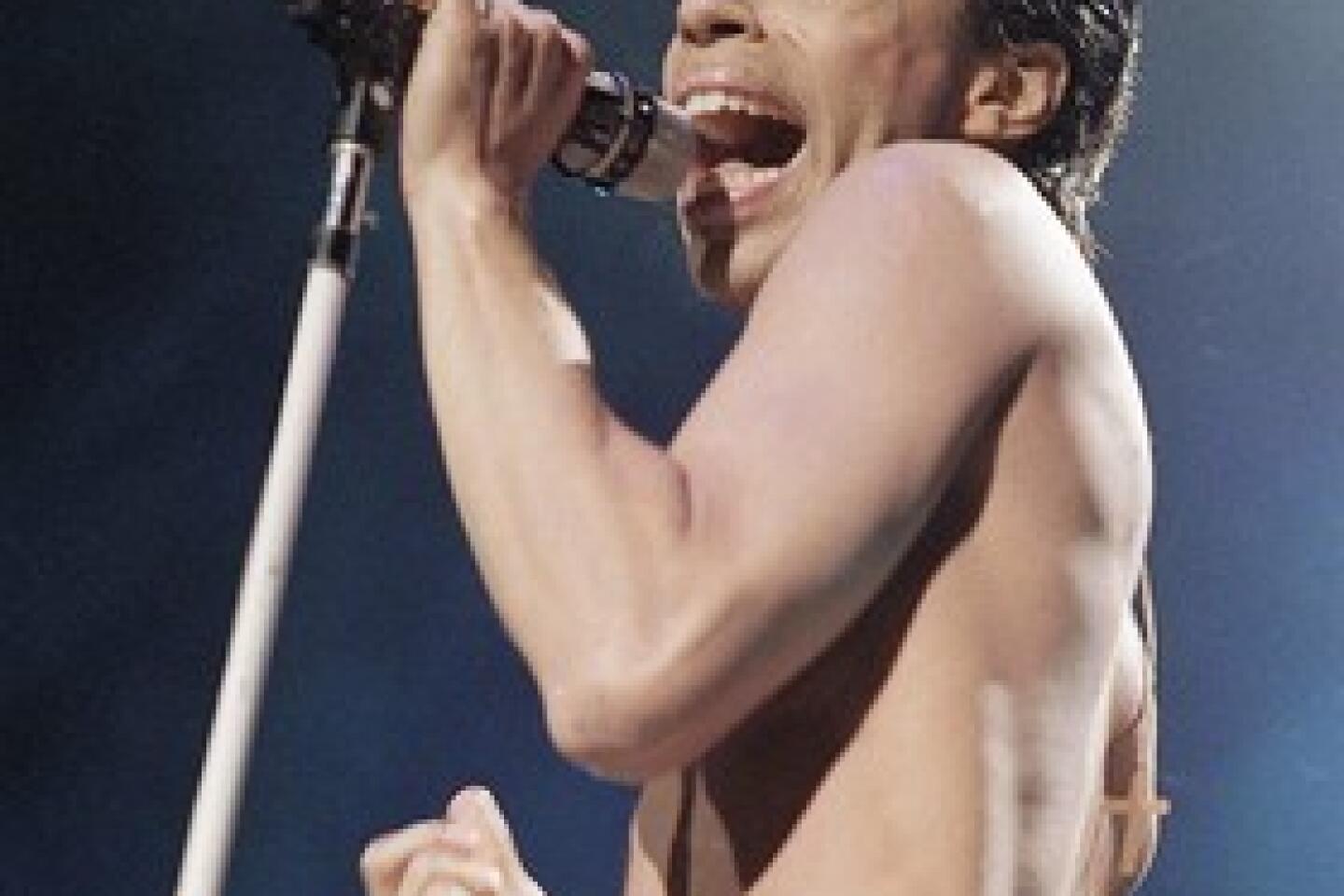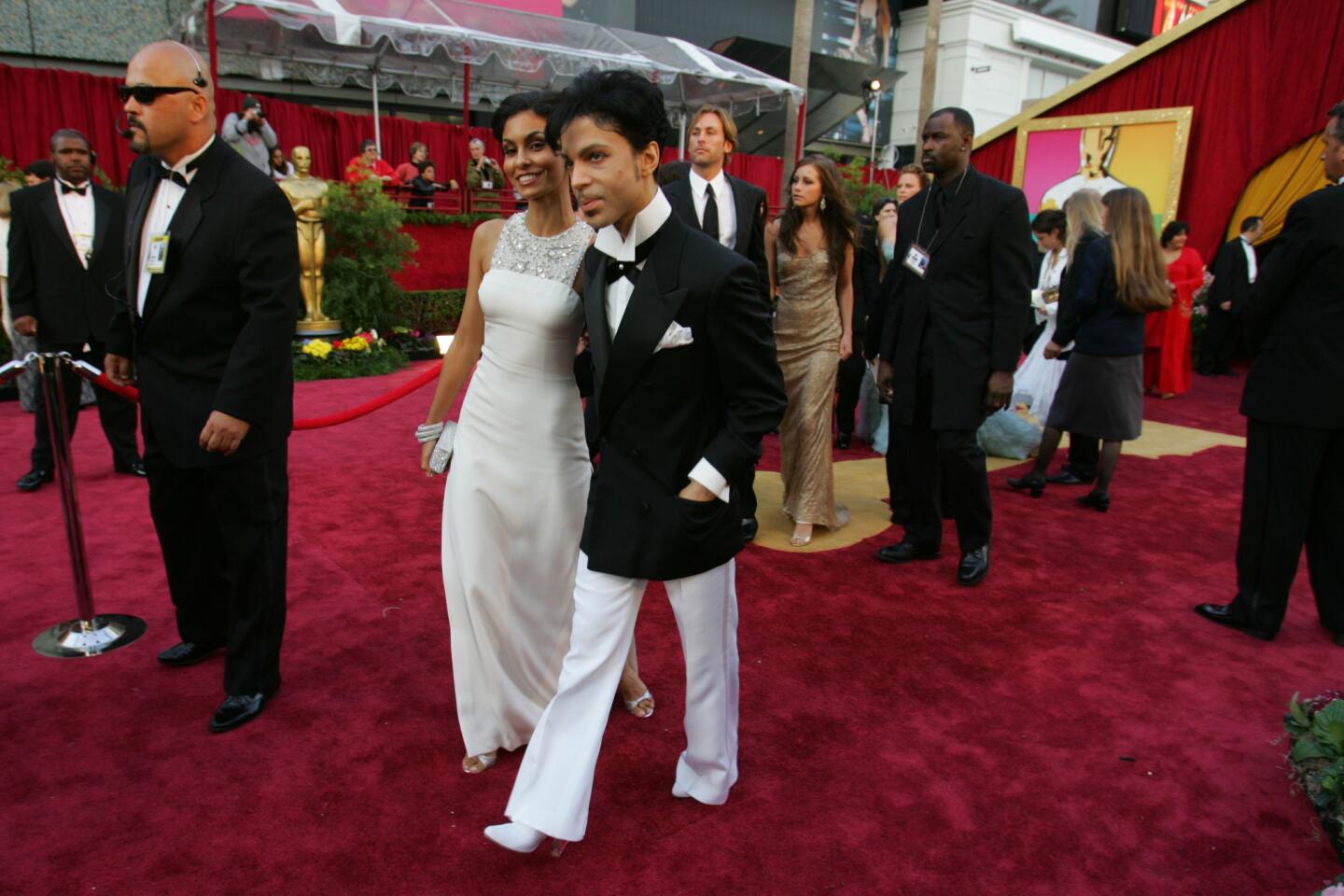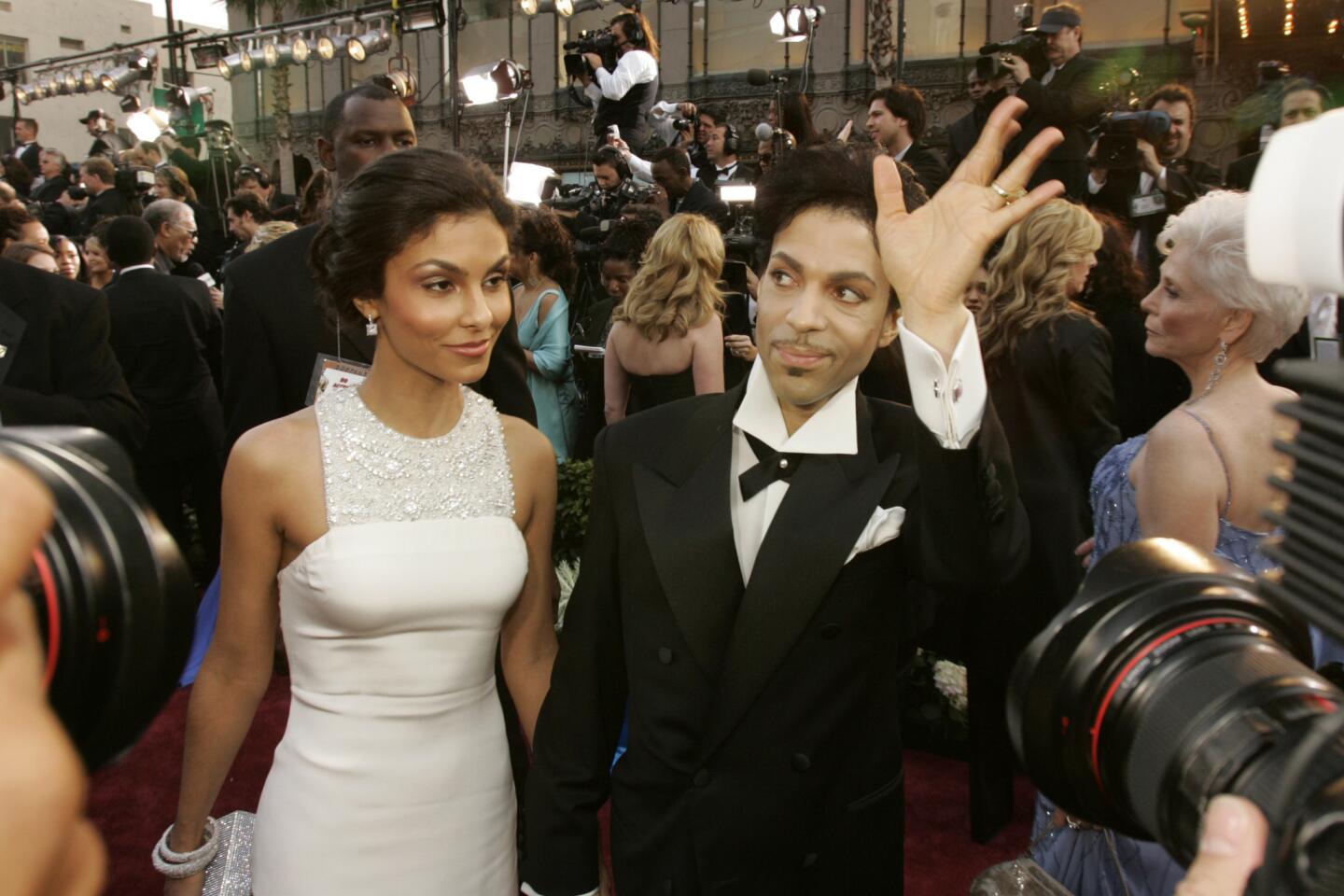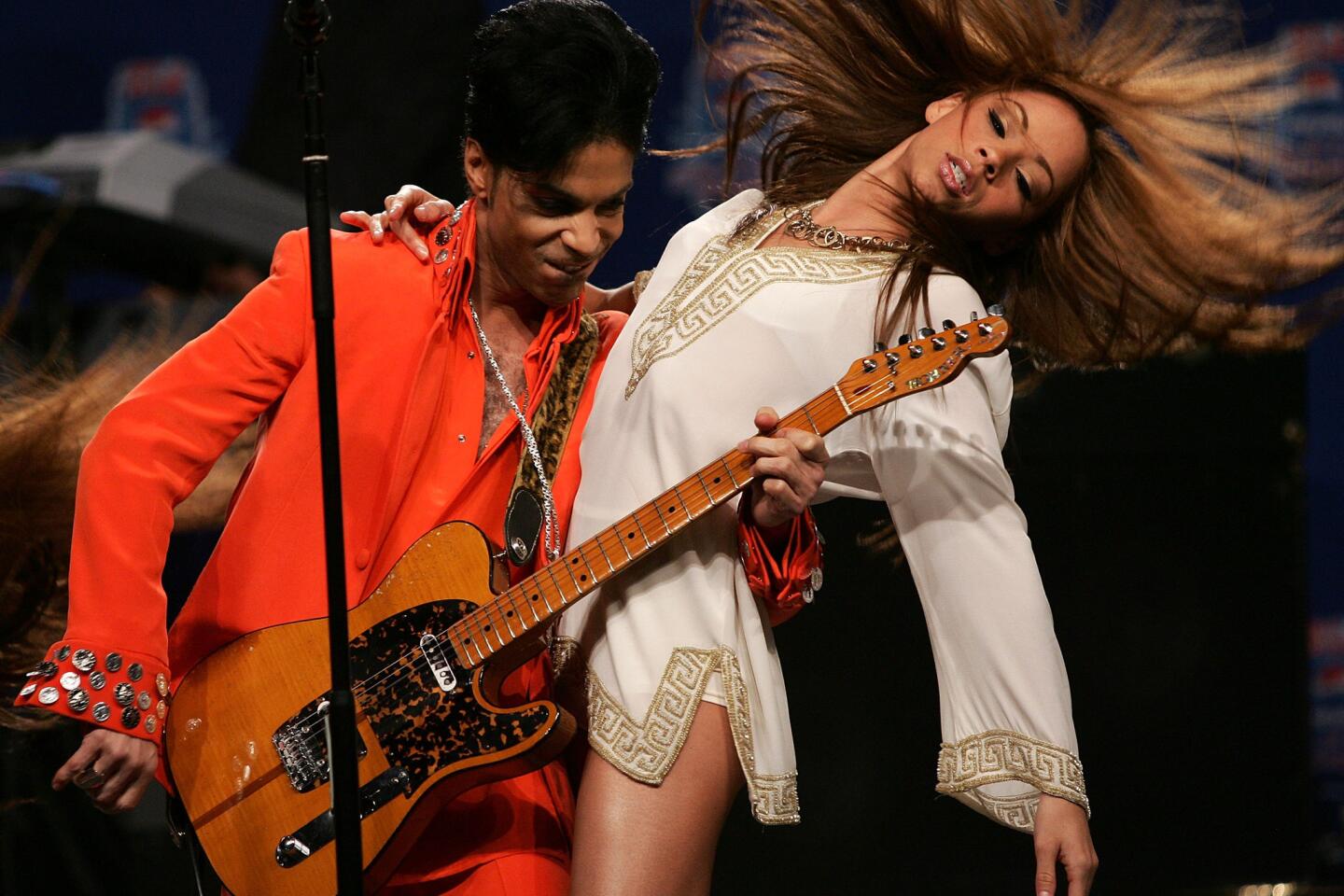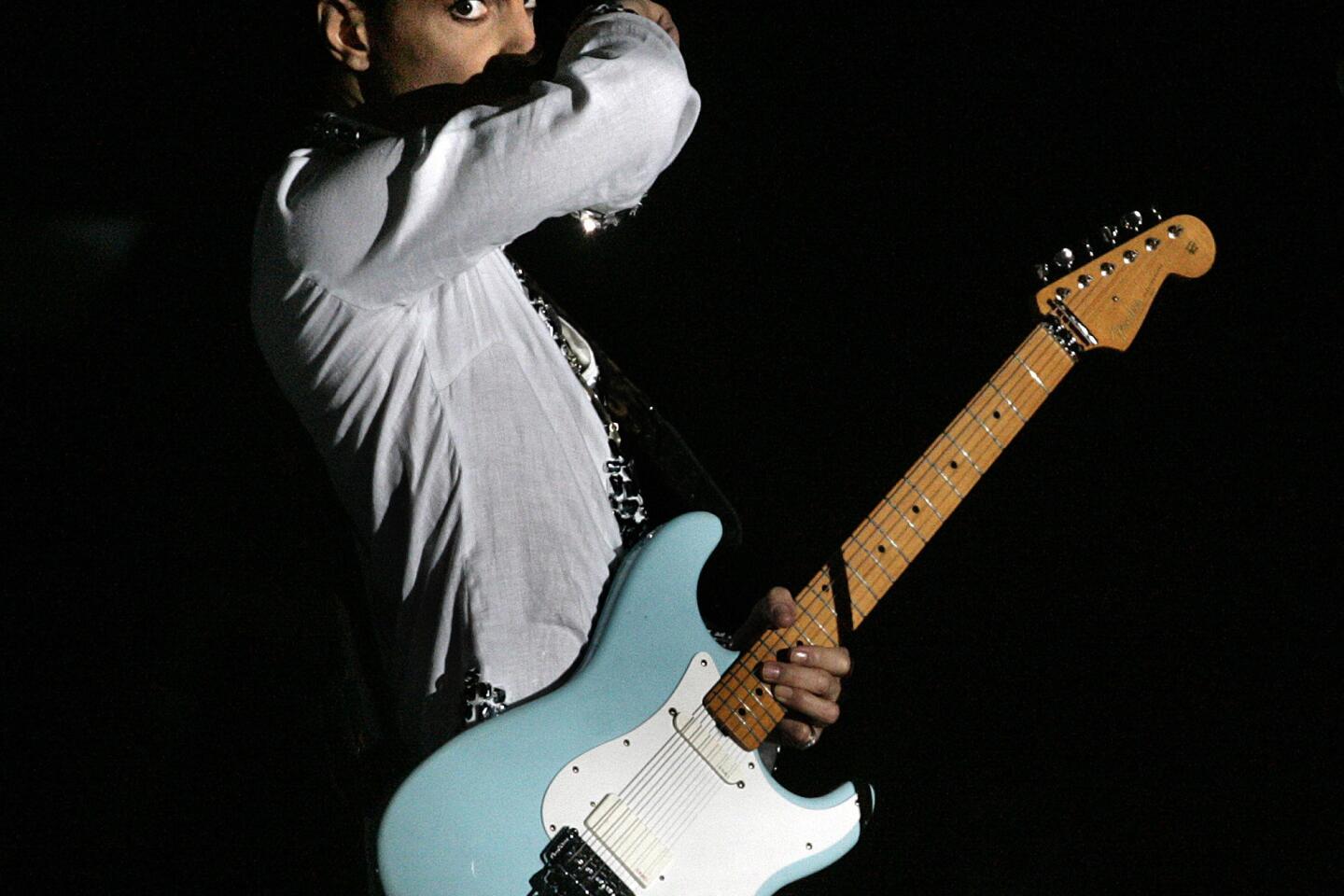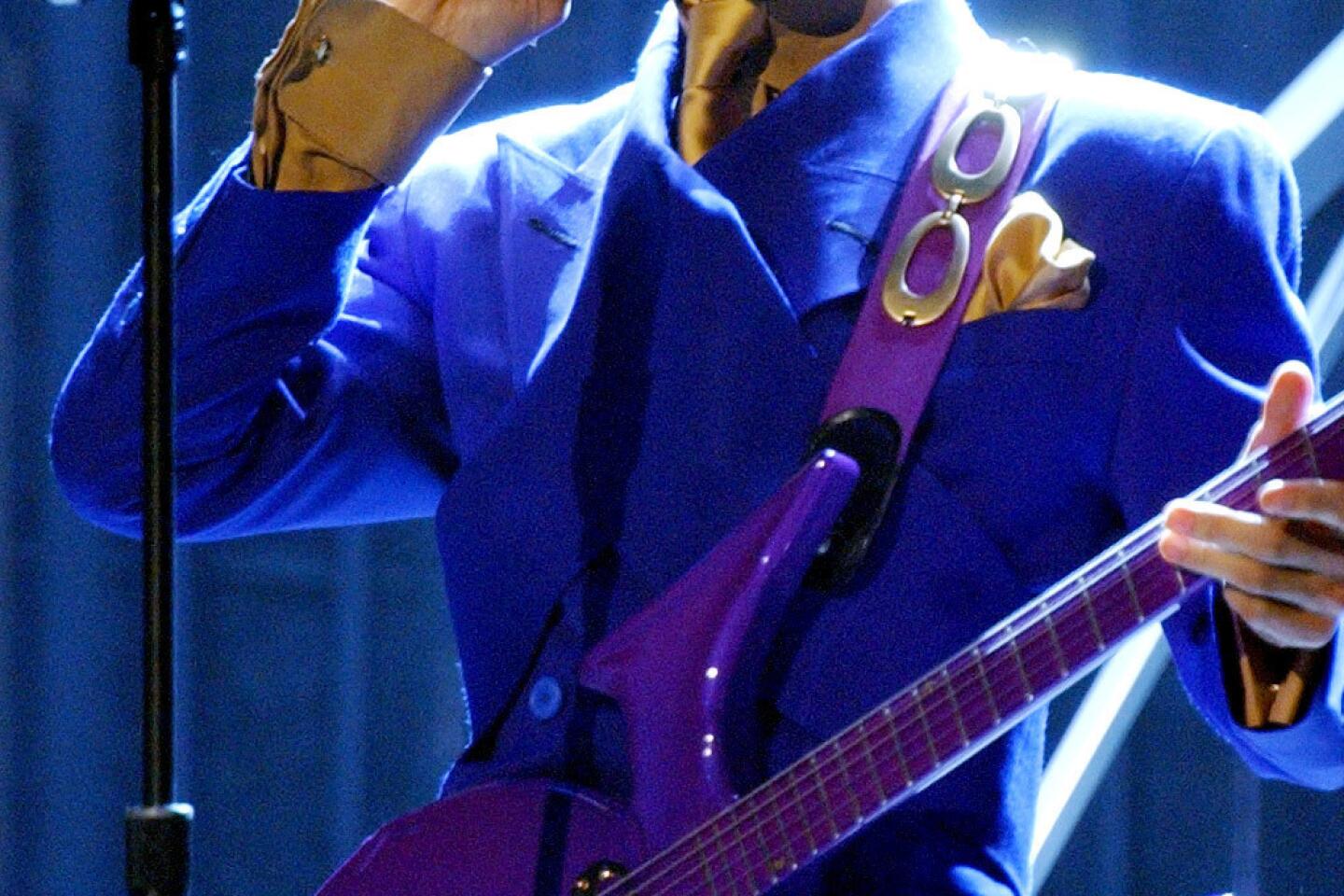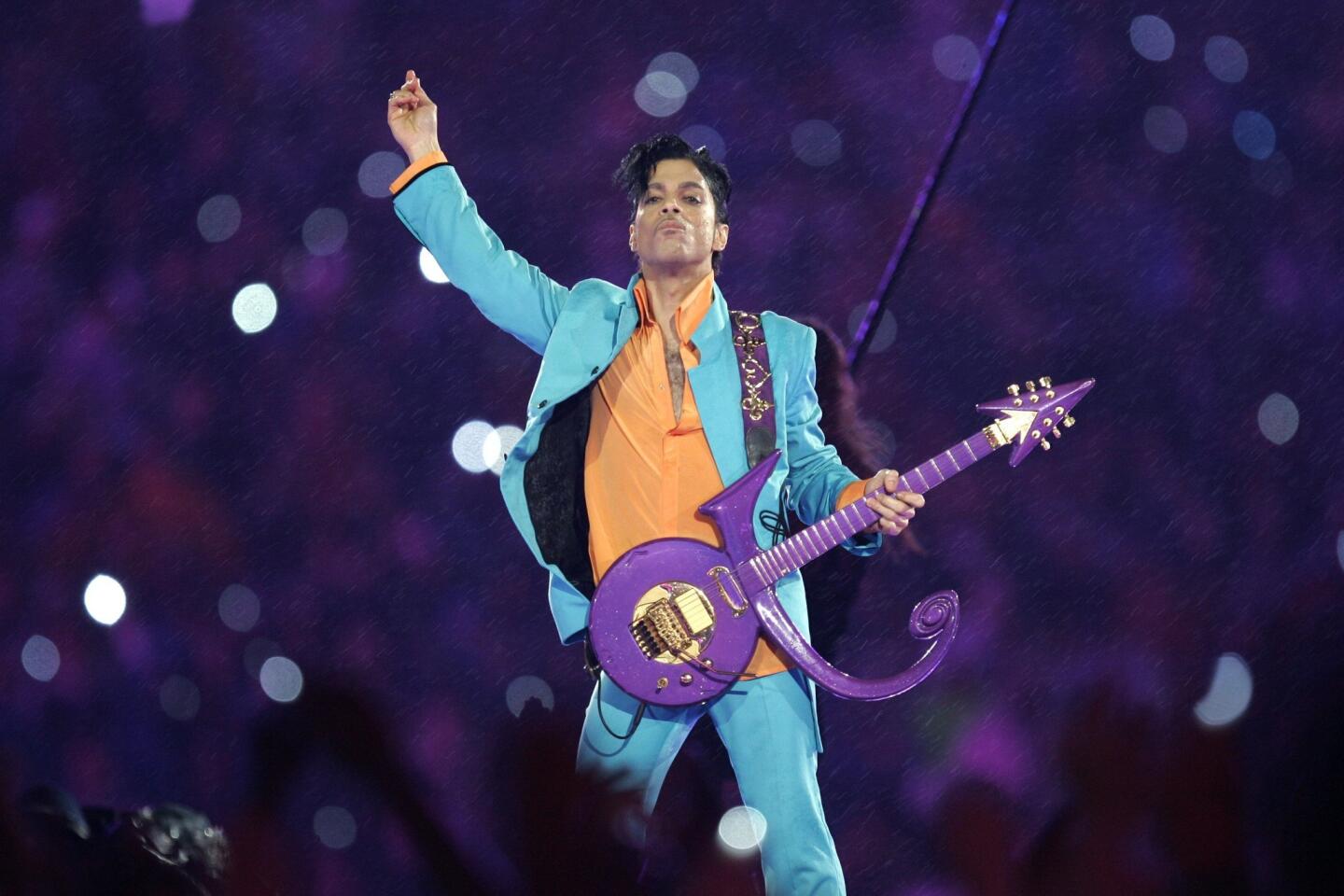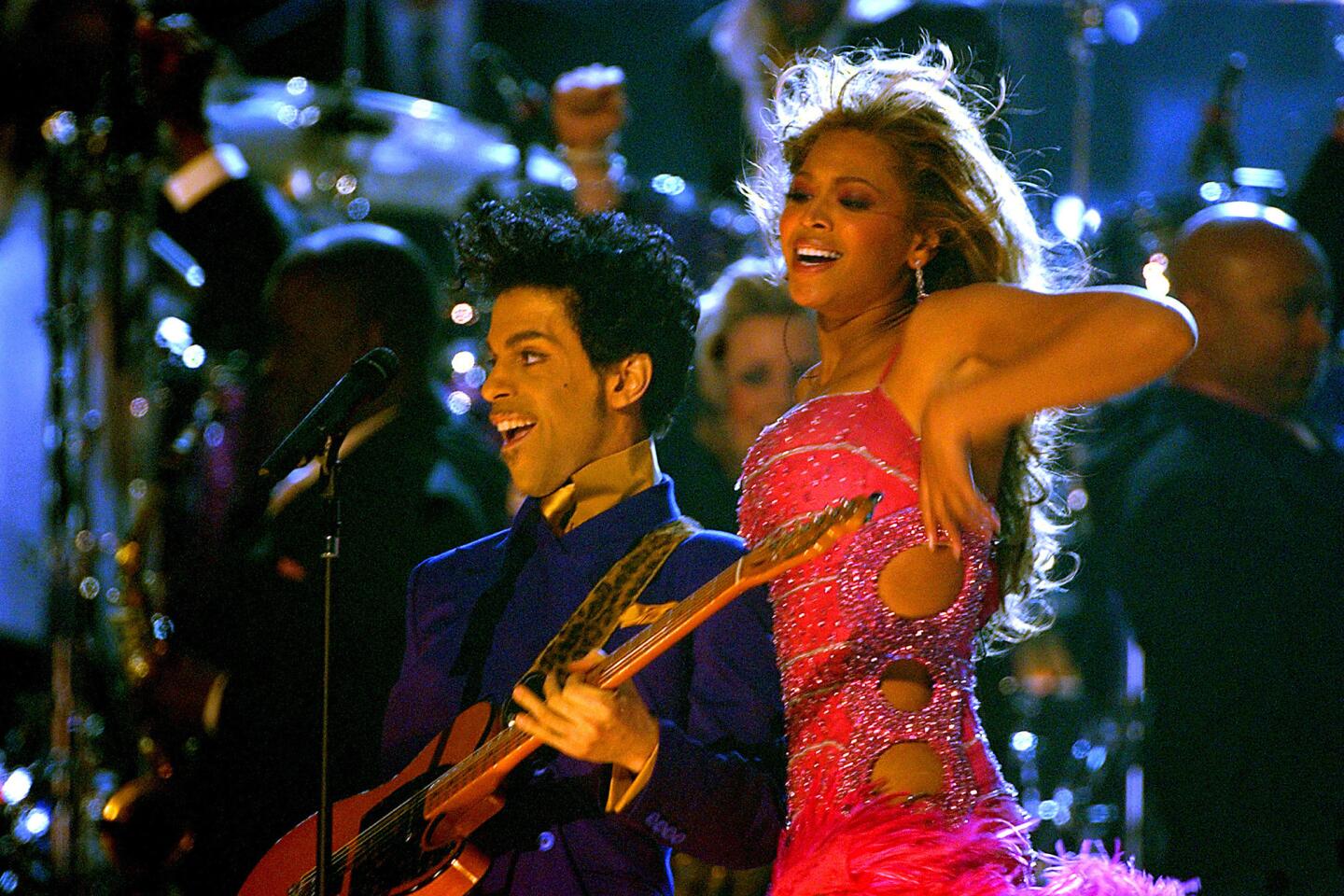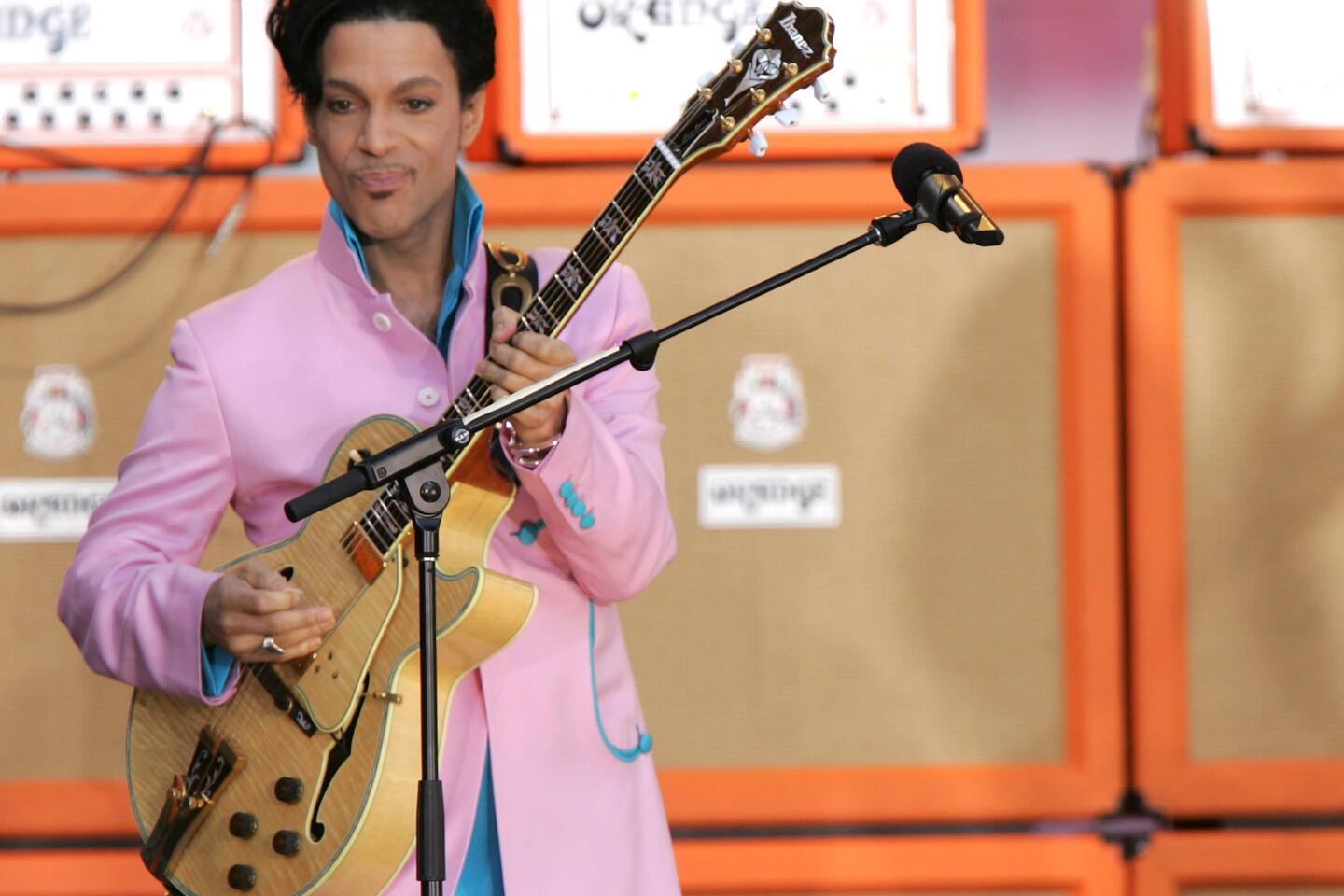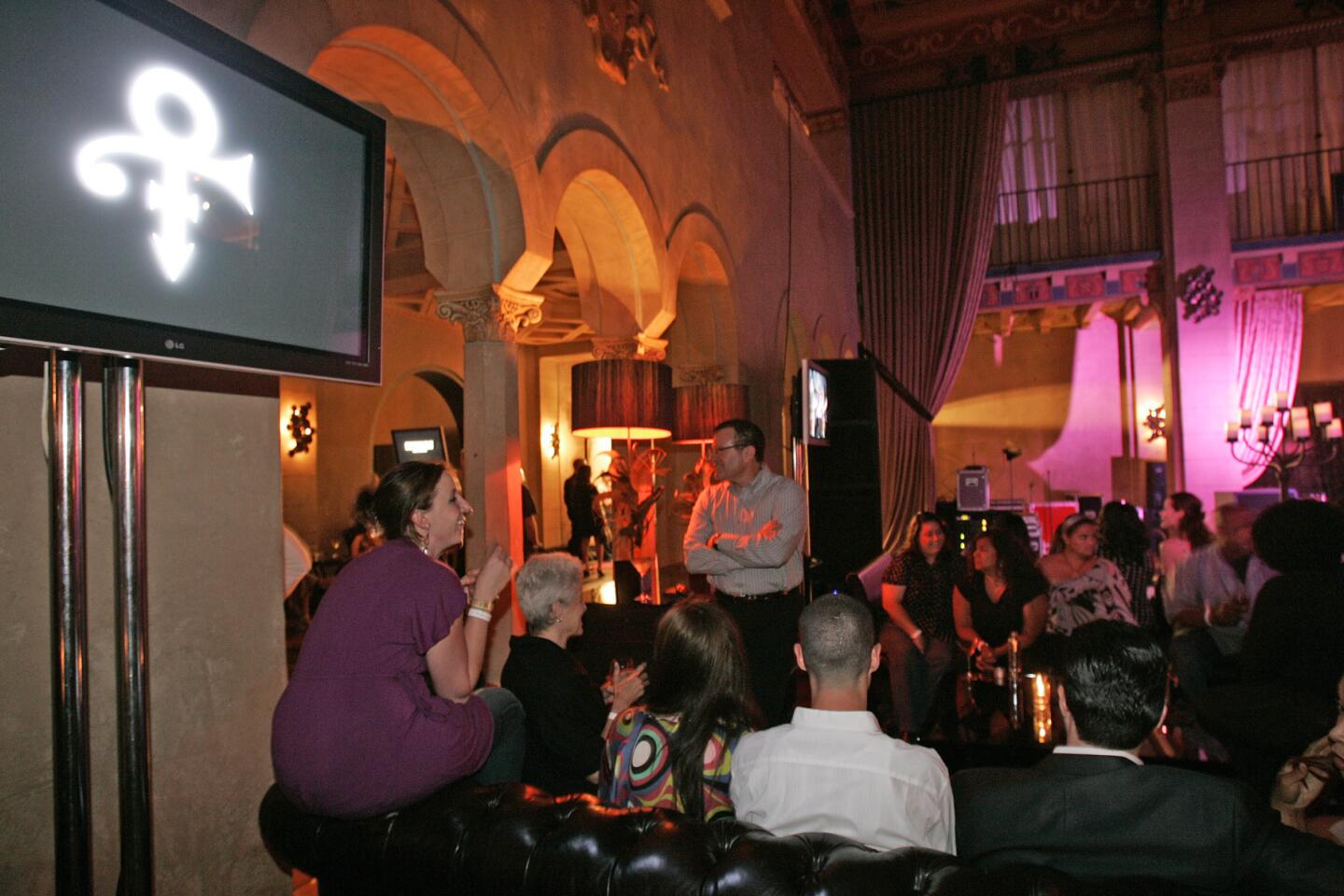From the archives:: Prince: ‘If I knew the things I know now before, I wouldn’t be in the music industry’
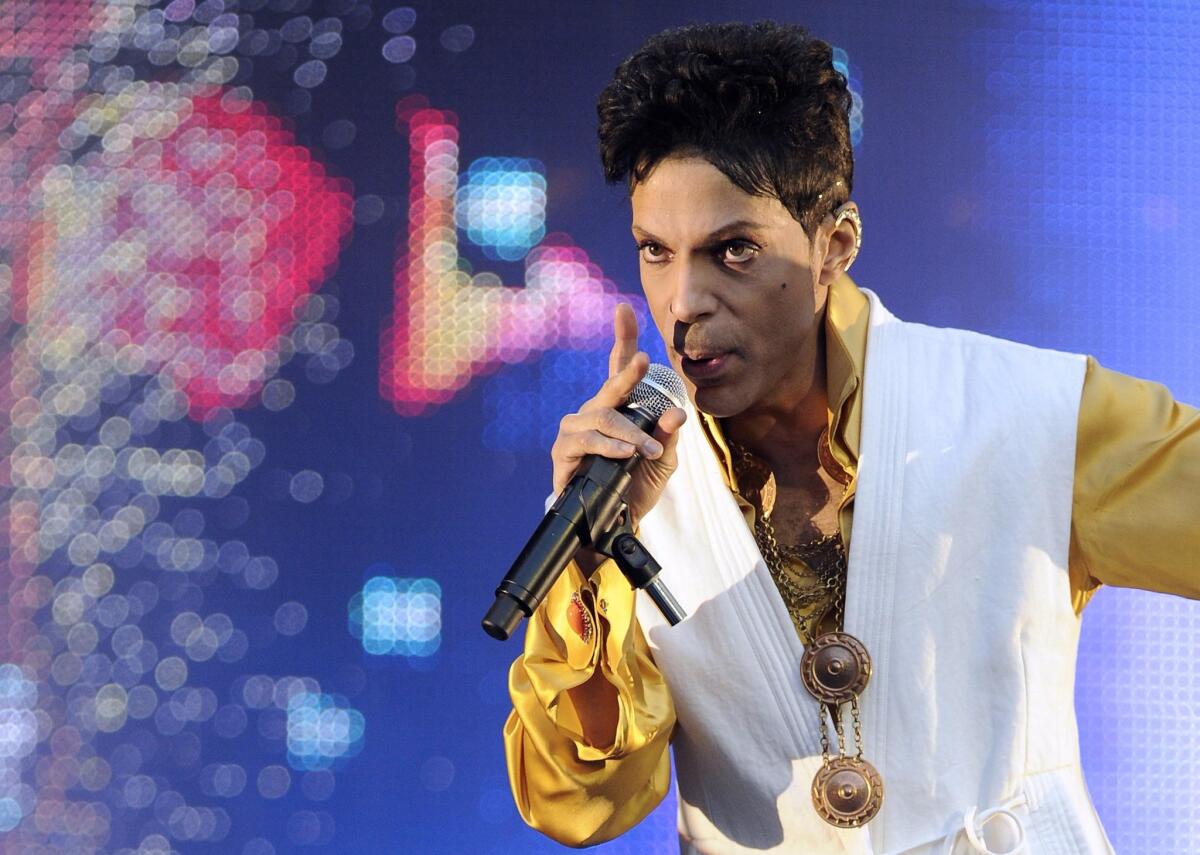
- Share via
Reporting from NEW YORK — Editor’s note: Prince, one of the bestselling pop artists of all time, died April 21, 2016, in his recording studio in Chanhassen, Minn..
In the past, the few reporters who have gained access to Prince Rogers Nelson had to submit to measures more befitting the secrecy of a covert military operation.
He insisted that interviewers not use tape recorders or take notes. Lots of topics were declared off limits, and the location of the encounter was always subject to a last-minute change.
Now, though, the elusive star has at least relaxed the rules enough to allow a little scribbling. And as he enters a plush hotel suite in midtown Manhattan--after a security guard has inspected the joint--his poker face slowly cracks into a gentle, disarming smile.
“Nice to meet you,” says the singer, his doe eyes warming. He sits on a sofa, looking a bit stiff in his impeccably tailored black suit as he waits to begin what he says will be his only U.S. interview in connection with his new “Chaos and Disorder” album.
“So, um, how much time we got?” he asks.
Like a lot of eccentrics, this diminutive icon, 38, turns out to be a rather shy, self-conscious fellow. His remarks during the interview are often painfully terse, sometimes willfully vague and on occasion petulant. But in general, he’s polite and earnest.
And while he’s predictably less than forthcoming on most personal matters, part of the reason he’s here today is to announce his impending divorce.
No, he’s not leaving Mayte, the dancer he married earlier this year and who is expecting their first child in the fall. Those subjects fall into the off-limits category anyway. This split is from Warner Bros., his record company for 18 years.
“Chaos and Disorder” will be his final effort for Warner Bros., he vows, without going into legal details. And despite his much publicized differences with the label, he claims to bear no real grudges.
“I was bitter before, but now I’ve washed my face,” he says. “I can just move on. I’m free.”
::
Tensions between artist and label first came to a boil in early 1994, when he decided to drop the name Prince and asked that people start identifying him by an unpronounceable symbol--thus disassociating himself, in a most burdensome way, from the guy who recorded some of the most popular and acclaimed albums of the ‘80s.
To further express his frustration, he stopped performing Prince-era material in concert and began appearing in public with the word “slave” written on his cheek. In 1994, he also released “The Most Beautiful Girl in the World,” a successful single that was distributed not by Warner Bros. but by the independent company Bellmark Records.
Bob Merlis, senior vice president of publicity at Warner Bros., confirms that “Chaos and Disorder” is expected to be the artist’s final album of newly recorded material for the label--although the company may continue to dip into Prince’s back catalog.
“Fulfilling the terms of his contract included delivering this new album and whatever the vault records will be,” Merlis says. “So I think it’s safe to say that he’s in a position now to make a new deal with another record company. We’ve come to a point where we feel that if he’s happier somewhere else, we don’t have any beef with him.”
At present, the artist hasn’t determined what his next step will be--or at least doesn’t wish to go on the record with it.
For all his maddening guardedness, the star--who has no plans to promote “Chaos and Disorder” with a tour, limiting his appearances to recent spots on David Letterman and “The Today Show”--seems genuinely torn about what his future will be beyond this album.
In one breath, he’ll say, “If I knew the things I know now before, I wouldn’t be in the music industry.” In the next, he’ll talk about his craft with such passion that it’s impossible to imagine him working in any other field.
What’s clear is that his experiences in the music industry have made him more sensitive to the travails and tantrums of other artists. He followed George Michael’s legal war to free himself from Sony Music and has also been keeping track of the plight of the hip-hop trio TLC, which last year declared bankruptcy in an effort to get out of the low royalty rate written into its contract.
“TLC is a very talented group,” he says. “Talent can’t be bottled up or contained. . . . We gotta wake up to that. Why should somebody else be making $100 million when they’re making $75,000? It will continue, too--that’s the sad truth.”
Prince’s history with Warner dates back to the late ‘70s, when he was signed to the label while still a teenager. After achieving his commercial breakthrough with 1982’s “1999” album, the androgynous, charismatic performer quickly became a pop sensation--many even considered him the foremost artist of his generation.
A one-man musical movement whose fiercely innovative blend of funk, rock and soul crossed racial and cultural boundaries, Prince reached his commercial peak with “Purple Rain,” the 13 million-selling soundtrack album for the semiautobiographical film in which he starred.
As the years passed, Prince produced and wrote hit singles for other artists, and his “Minneapolis sound” had an enduring impact on contemporary R&B. Meanwhile, the star himself continued to release his own albums--some breathtaking, others spotty--at a breakneck pace.
With his sales declining, Warner began questioning his game plan.
Prince argued that his record company, fearing that his pace would undercut his profitability, was trying to stifle him by not allowing him to release albums as frequently as he wanted to. He dismisses the label’s concern as “having nothing to do with a man’s soul or his need to express himself.”
Matters grew worse when Warner decided in 1994 to drop its distribution deal with Paisley Park Records, the Minneapolis-based label that Prince had established more than a decade earlier. The label had been losing money since its inception, but Prince says it was a lack of corporate support that did the project in.
“I was under the assumption that [Paisley Park] was a joint effort with lawyers and businessmen,” he explains, a little obliquely. “All we do as artists is make the music. I didn’t think I’d have to be marketing the records, or taking them to the [radio] station. If Michael Jordan had to rely on someone to help him dunk, then there would be some trouble.”
While the artist insists that his problems with Paisley Park and Warner in general haven’t had a traumatic impact on his bank account (“I’m not in financial straits”) and never will be,” he says firmly), they clearly haven’t had a positive effect on his career.
“Diamonds and Pearls,” which has sold 2.3 million in this country since its release in 1991, was his last genuine smash among his new studio collections. Last year’s “The Gold Experience” hasn’t broken the 500,000 sales mark and this year’s “Girl 6,” the soundtrack collection which combined new and old Prince recordings, has sold less than 100,000 units, according to SoundScan.
So he could use a hit album right now, to remind folks that there’s a reason we all began suffering his antics in the first place.
True to its title, “Chaos and Disorder” rocks hard, but it’s also typically eclectic, with passages of wistful guitar-pop and lithe funk. The artist cites a rather unexpected point of reference in explaining his approach to the album.
“Someone told me that Van Halen did their first record in a week,” he says. “That’s what we were going for--spontaneity, seeing how fast and hard we could thrash it out. It was done very quickly, and we achieved what we wanted to achieve in that period of time.”
In speaking about his songwriting, he actually expresses a greater feeling of being misunderstood than he does in his accounts of the music business. He’s particularly disturbed by this wacky theory that he’s obsessed with sex.
It seems that the man who evoked the ire of rock music watchdog groups with a graphic account of masturbation, and who later designed a cave for his stage show as a replica of female sex organs, is a little frustrated by the fact that some people focus chiefly on the carnal elements in his lyrics--which, to be fair, have also addressed the subtler aspects of relationships, as well as larger social issues.
“You know, there are people who view positivity, rather than sex, as the biggest factor in my writing,” he points out. “But then, they’re more sexual, I guess.”
He adds that he’s always “had good relationships with women--much better than I have with men.” He continues to populate his band with female musicians, and he repeatedly brings up the name of R&B maverick Me’Shell Ndegeocello, with whom he seems to have formed a sort of mutual admiration society.
“Me’Shell and me are like this,” he says, holding two fingers together. “She’s really quiet and soft-spoken, but when she picks up an instrument. . . . Musicians, when they really communicate, don’t have to talk. They just play.”
He pauses, then adds, a touch mysteriously: “The people who are supposed to understand do understand. You learn that more and more as you grow older. After I’m free from Warner Bros., it’ll either be very quiet or very exciting. But it won’t be in the middle. It’ll be extreme. Life, I mean. It’ll all be extreme.”
MORE ON PRINCE
Celebrities react to Prince’s death: ‘And just like that ... the world lost a lot of magic
Review: Prince dazzles and baffles on two new releases
From the Archives: Just how princely is Prince’s Warner Bros. deal?
More to Read
The biggest entertainment stories
Get our big stories about Hollywood, film, television, music, arts, culture and more right in your inbox as soon as they publish.
You may occasionally receive promotional content from the Los Angeles Times.
